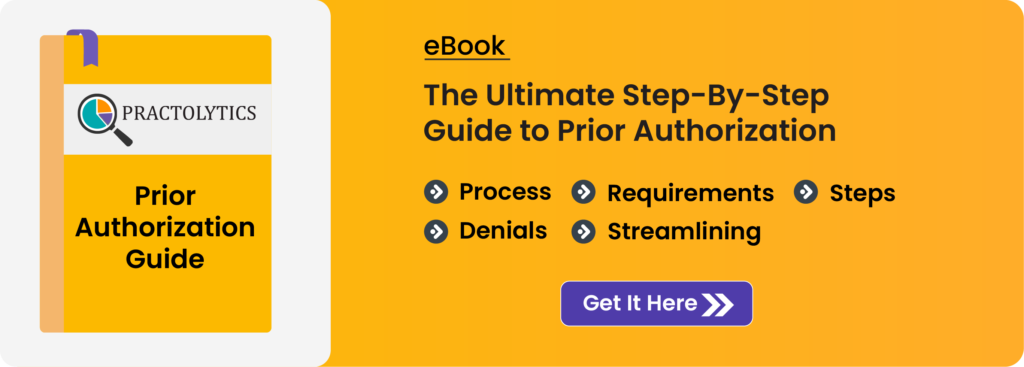Streamlining Prior Authorization for Specialty Drugs
Streamlining Prior Authorization for Specialty drugs can be amazing, but getting approvals? Total headache. From MS meds to cancer therapies, the paperwork, follow-ups, and insurer back-and-forth can eat up your team’s time and slow down patient care. That’s where outsourcing prior authorizations with a team like Practolytics comes in. We make approvals faster, cut denials, and free up your staff to actually focus on patients. Using a smart mix of tech and expertise, it keeps revenue steady, patients happy, and your practice running smoothly. Basically, it’s all about getting approvals done smarter, easier, and way less stressful.
Let’s be real—specialty drugs are incredible, right? Treatments for multiple sclerosis, rheumatoid arthritis, and groundbreaking cancer immunotherapies are changing lives every day. But if you work in a specialty practice, you also know the other side of the story: the headaches. The paperwork, the follow-ups, the approvals… it can feel never-ending.
This is exactly where things can either make your day or completely drain your team. That’s why at Practolytics, we’ve been helping practices take the stress out of prior authorization, making it faster, smoother, and way less painful for staff and patients alike.
So, what’s the real deal with prior authorization for specialty drugs? Why does it matter so much, and how can practices actually make it easier? Let’s break it down.
Table of Contents
Why Specialty Drugs Need Extra Care?
Here’s the thing: these aren’t your everyday prescriptions. They’re expensive, complex, and insurers want to make sure every approval makes sense. Some cancer immunotherapies? Over $100,000 a year. MS or RA therapies? Tens of thousands.
Insurers get picky—they want labs, clinical notes, and previous treatment history. Sometimes, they’ll even call your team directly. Miss one document, and suddenly treatment is delayed—or worse, denied.
MGMA data from 2023 shows that one in four patients faces delays because of administrative hurdles, and roughly 80% of denials could have been avoided with proper prior authorization. That’s massive—not just for revenue, but for patient care too.
And let’s not forget safety. Specialty drugs can have serious side effects or need close monitoring. Approvals are more than just red tape—they’re about getting patients the right treatment, at the right time, safely.
How Prior Authorization Really Works?
Think of healthcare prior authorization services like a well-choreographed dance—you miss a step, and the whole performance suffers. Here’s how it usually goes:
- First, figure out if the drug or treatment actually needs approval.
- Gather all relevant documents—labs, notes, prior treatments.
- Submit everything to the insurer, making sure nothing’s missing.
- Follow up if the insurer asks for more info.
- Let your team and the patient know the outcome.
Specialty medications can take anywhere from 3 to 14 business days, possibly more if extra assessments are required. Those extra days can quickly mount up, and not in a good way.
Seeing the Numbers!!!
To give you a clearer picture:
|
Drug Category |
Average Annual Cost |
Average Approval Time |
Common Documentation |
Potential Denial Rate |
Key Challenges |
|
Multiple Sclerosis |
$60,000–$90,000 |
5–10 days |
MRI reports, labs, prior therapy history |
35–40% |
Lots of paperwork, repeated follow-ups |
|
Rheumatoid Arthritis |
$30,000–$70,000 |
4–7 days |
Labs, clinical notes, prior medications |
25–30% |
Dosage checks, prior therapy verification |
|
Cancer Immunotherapy |
$100,000+ |
7–14 days |
Tumor profiling, labs, prior oncology treatments |
40–50% |
Peer-to-peer reviews, insurer complexity |
|
Other Specialty Drugs |
$10,000–$50,000 |
3–7 days |
Labs, prior treatment history |
20–35% |
Different insurer rules, changing formularies |
Even a few days of delay can affect patient care, and missing or incorrect info? That’s basically asking for denials.
What Delays Really Cost You?
When prior authorizations drag, everyone feels it. Staff spend hours on follow-ups, patients wait, and revenue slows down.
- Revenue: Denied or delayed claims hurt, big time.
- Staff: Stuck on paperwork instead of patient care.
- Patients: Waiting for treatments can frustrate them and affect adherence.
The 2023 AMA survey found doctors spend roughly 13 hours a week just on prior authorization sevices. That’s 13 hours away from patients, training, or growing the practice.
What Difference a Streamlined Prior Authorization Makes!
When you get outsourcing prior authorization services right, the impact is huge:
|
Metric |
Before Optimization |
After Optimization |
Improvement |
|
Average Approval Time |
7–14 days |
3–5 days |
50–70% faster |
|
Denial Rate |
30–50% |
10–15% |
60–70% reduction |
|
Staff Hours Spent Per Week |
13 hours |
4–5 hours |
60% less workload |
|
Patient Treatment Delays |
25% of cases |
5–10% |
60–80% fewer delays |
|
Revenue at Risk |
High |
Low |
Revenue secured |
Faster approvals mean happier patients, less stressed staff, and more predictable revenue. It’s a win all around.
Technology Is Helpful, But Not Enough!
Automation helps, no doubt. It tracks submissions, reduces errors, and standardizes paperwork. But with specialty drugs, sometimes you need more than a robot can handle.
- Complex cases still require clinical judgment.
- Off-label treatments or exceptions may need direct discussions with insurers.
- Peer-to-peer reviews are often unavoidable for high-cost therapies.
That’s why combining automation with human expertise works best. The tech handles repetitive work, and the experts handle the nuance. Otherwise, even the best tech can leave gaps—and those gaps can cost time, money, and patient satisfaction.
Why Outsourcing Prior Authorization Actually Works?
Let’s be honest—handling prior authorizations in-house for specialty drugs can be a huge headache. There’s paperwork everywhere, phone calls to insurers, updates for patients… it just never ends. That’s why outsourcing isn’t just a “nice-to-have.” For specialty practices, it’s a total game-changer.
When you team up with an experienced PA crew, you’re tapping into expertise right away. They know every specialty drug—everything from MS meds to those high-priced cancer immunotherapies. They get what insurers are looking for, can handle the tricky cases, and know how to get answers fast. That means less back-and-forth, approvals that happen quicker, and a workflow that actually runs smoothly.
And the best part? Approvals happen way faster. What used to take weeks can now be done in just a few days. Denials drop too. Outsourced teams double-check every submission, flag missing info, and make sure everything’s complete before it even reaches the insurer. Practices can see denial rates drop by up to 60%. That’s less stress for staff, happier patients, and more predictable revenue.
Speaking of revenue, timely approvals protect your bottom line. Every delayed or denied claim costs money. With outsourcing, approvals happen on time, keeping revenue flowing. And your team? They get their time back. No more spending hours chasing paperwork—they can focus on patient care instead.
Over time, outsourced PA teams also help spot patterns in denials, improve documentation, and even predict tricky approvals. It’s like having a safety net for your workflow. All in all, outsourcing turns prior authorization from a frustrating bottleneck into a smooth, stress-free system—for your staff, your patients, and your practice’s revenue.
Real-Life Example
A neurology practice handling multiple MS therapies was spending 15 hours per week on PA tasks, with approvals taking almost two weeks.
After partnering with Practolytics:
- Approvals dropped from 12 days to 4.
- Staff workload fell by 70%.
- Revenue at risk due to denied claims decreased by 40%.
Patients got treatment on time, staff stress dropped, and revenue became predictable. Simple, but powerful.
Making Prior Authorization Part of Practice Success!
PA isn’t just paperwork—it’s part of running a smooth, healthy practice. Streamlined workflows lead to:
- Optimized claims: fewer denials.
- Predictable revenue: easier financial planning.
- Compliance: better documentation reduces audit risks.
And here’s the kicker: when PA runs well, patient satisfaction improves, adherence goes up, and your practice actually feels like it’s in control.
Looking ahead!!!
Best Prior authorization services is changing. Implementing these enhancements can save time and effort, minimize rejections, as well as guarantee that patients have access to health treatment when they are in need of it. It’s no longer just about documentation; it’s about creating a system that benefits both staff and patients.
Electronic Prior Authorization (ePA) is a significant change. Rather than waiting days or weeks for approvals, ePA allows insurers to respond immediately. This can make a significant difference for Specialty clinics—patients receive medications or treatment faster, and your team spends less time buried in paperwork.
AI-assisted pre-screening is another new advancement. These advances in technology are not meant to replace human expertise, but instead to improve it. Artificial intelligence can locate incomplete paperwork, pinpoint mistakes, and even anticipate which applications will be denied. This built-in checks minimizes errors, accelerates approvals, as well as frees your staff to zero in on treating patients rather than documentation.
Collaborative platforms are driving a revolution in communication. These tools have an impact on how your practice, insurance, and PA experts engage in a single centralized spot, eliminating long email chains and endless phone calls. This results in quicker approvals, more uniform information, and everyone is in the loop. Even with these new concepts, the opinion of others remains vital. Specialty drug approvals still require considerable consideration and understanding. The future of prior authorization is to combine smart technology with experienced professionals to produce a seamless, efficient, and dependable procedure.
Why Outsourcing Prior Authorization Works?
Outsourcing prior authorization isn’t just about making life easier—it’s a smart move for any specialty practice. It saves time, keeps revenue on track, and helps patients get the care they need faster. When done right, PA isn’t just paperwork; it’s the link between offering advanced treatments and actually getting patients the results they need.
For over 20 years, Practolytics has been helping multi-specialty practices handle prior authorizations without the usual headaches. We process 5 million claims a year, cover 31 states, and work with more than 1,400 active providers. Basically, we bring together smart technology, clinical know-how, and operational experience to make approvals faster and way less stressful.
Outsourcing your prior authorizations means your team spends less time stuck in paperwork and more time focusing on patients. Every submission is carefully reviewed, which not only speeds things up but also reduces the back-and-forth with insurers.
It’s also a big win for your revenue. Late or denied claims can cost a lot, but an experienced outsourced team keeps approvals on track and consistent.
Prior authorization isn’t just another task on the list—it’s a crucial step to making sure patients get the care they need. Letting experts handle it makes your practice run smoother, takes the pressure off your staff, and improves the overall experience for patients.
Read More – Prior Authorization Services for Podiatry : improving Patient Access and Care
Talk to Medical Billing Expert Today — Get a Free Demo Now!





